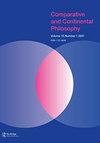Being Without World: A Phenomenological Reading of the Findings on Torture in the Colombian Truth Commission’s Final Report
IF 0.3
0 PHILOSOPHY
引用次数: 0
Abstract
ABSTRACT This paper explores the theme of torture in the Colombian Truth Commission’s Final Report, focusing on its characterization of torture as a way of annulling a person’s identity. Drawing on Jean Améry’s approach, I argue that torture destroys the victim’s world and explore the further implications of this assertion. I begin by highlighting how the history of torture distorts legal and medical practices, masquerading as a quest for truth while exercising a farce of power, disintegrating the victim’s lived body. By delving into Merleau-Ponty’s notion of “flesh,” I also explain how torture erodes the carnal trust that connects us to the world and enables proper communication. Consequently, torture results in an utter negation of the self and the world. In conclusion, I suggest that torture as understood as the destitution of a person’s world, can serve as a paradigm for comprehending the experiences of violence faced by victims in Colombia.没有世界:从现象学角度解读哥伦比亚真相委员会最后报告中关于酷刑的调查结果
本文章由计算机程序翻译,如有差异,请以英文原文为准。
求助全文
约1分钟内获得全文
求助全文

 求助内容:
求助内容: 应助结果提醒方式:
应助结果提醒方式:


